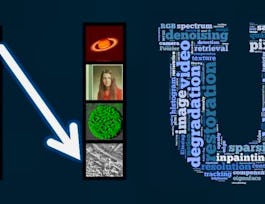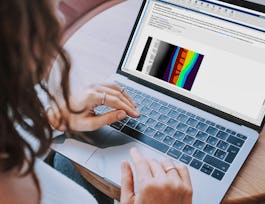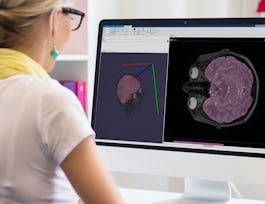In this course, you will learn the science behind how digital images and video are made, altered, stored, and used. We will look at the vast world of digital imaging, from how computers and digital cameras form images to how digital special effects are used in Hollywood movies to how the Mars Rover was able to send photographs across millions of miles of space.


Image and Video Processing: From Mars to Hollywood with a Stop at the Hospital
Taught in English
Some content may not be translated
65,075 already enrolled
Course
Gain insight into a topic and learn the fundamentals

Instructor: Guillermo Sapiro
Top Instructor
(1,095 reviews)
Skills you'll gain
Details to know

Add to your LinkedIn profile
8 quizzes
See how employees at top companies are mastering in-demand skills


Earn a career certificate
Add this credential to your LinkedIn profile, resume, or CV
Share it on social media and in your performance review

There are 9 modules in this course
Learn what is image and video processing. Learn the very basic concepts of human perception needed for understanding image processing. Learn simple tools in signal processing needed to understand following units.
What's included
8 videos1 reading1 quiz
JPEG and MPEG are the most successful algorithms in the area, widely used by everybody in a daily basis, and the goal of this unit is to understand how they work. Also to understand why these techniques are important and why they are enabling technologies. Also will describe what is done in the Mars expedition.
What's included
7 videos1 reading1 quiz
Some of the most basic tools in image processing, like median filtering and histogram equalization, are still among the most powerful. We will describe these and provide a modern interpretation of these basic tools. Students will then become familiar with simple and still popular approaches. We will also include non-local means, a more modern technique that still uses classical tools.
What's included
14 videos1 reading1 quiz
The goal of this unit is to complement Unit 3 by adding prior information about the sources of degradation. Students will learn that if we know about the degradation process, we can do better. The objective of this unit is to complete the training with basic and powerful classical tools.
What's included
9 videos1 reading1 quiz
Not all parts of the image are the same, and students will learn the basic techniques to partition an image, from simple threshold to more advanced graph cuts and active contours. This is the first unit where student will learn about image analysis and image interpretation, and will learn why this is important, e.g., in medical imaging and object recognition.
What's included
12 videos1 reading1 quiz
This is all optional material. It will help the students that are more mathematically oriented and want to better understand the math behind next unit's lectures. But you will be able to handle without it.The quiz is therefore practice only.This is the first “advanced” unit and smoothly follows from the previous one. Students will learn very modern tools, widely used today, and will contrast with units 3,4 to illustrate how significantly more advanced mathematical tools are also very useful in image and video analysis. We will connect some of these advanced tools with classical ones, e.g., average with heat flow and median with anisotropic diffusion. This will help to provide unified views to the students.
What's included
9 videos1 reading1 quiz
Students will get involved with a very exciting topic, since image and video inpainting is one of the most used tools in the movie industry. They will learn the problem, and also how they can approach it from multiple directions. This will also help to illustrate how the same problem can be approached from multiple mathematical angles. We will connect this with Shanon’s work providing yet another angle. If you watched the lectures on PDEs you will have more mathematical background, but you will enjoy this unit and learn without it as well.
What's included
7 videos1 reading1 quiz
Here the goal is to present one of the most modern tools in image and video processing, and students will learn something that is today at the top of active research. This will also help to illustrate the use of linear algebra and optimization in image and video processing. This is the last formal unit of the course.
What's included
8 videos1 reading1 quiz
This is a bonus unit. Enjoy it. Image processing has been very successful in medical imaging, and we will use examples from HIV and brain research to illustrate the importance of image processing in solving societal problems. We will describe the basic tools in these exciting applications, from the acquisition to the analysis.
What's included
5 videos
Instructor

Offered by
Recommended if you're interested in Math and Logic

Northwestern University

Google Cloud

MathWorks
Why people choose Coursera for their career




Learner reviews
Showing 3 of 1095
1,095 reviews
- 5 stars
79.63%
- 4 stars
16.07%
- 3 stars
2.46%
- 2 stars
0.73%
- 1 star
1.09%

Open new doors with Coursera Plus
Unlimited access to 7,000+ world-class courses, hands-on projects, and job-ready certificate programs - all included in your subscription
Advance your career with an online degree
Earn a degree from world-class universities - 100% online
Join over 3,400 global companies that choose Coursera for Business
Upskill your employees to excel in the digital economy
Frequently asked questions
Yes
Some but not much. If you have you will get a more in depth understanding. We hope you know linear algebra for example. Again, some concepts you will grasp even without strong mathematical background. Some will consider this an advanced undergrad class.
Who doesn't?



